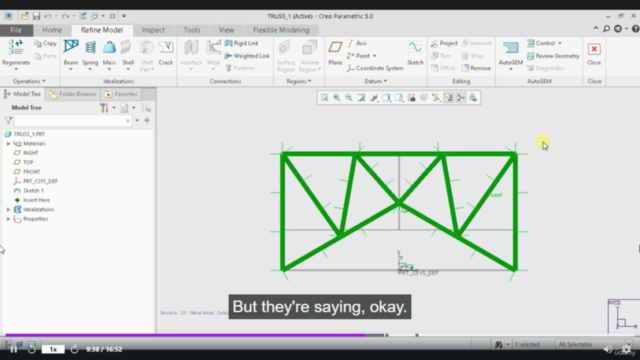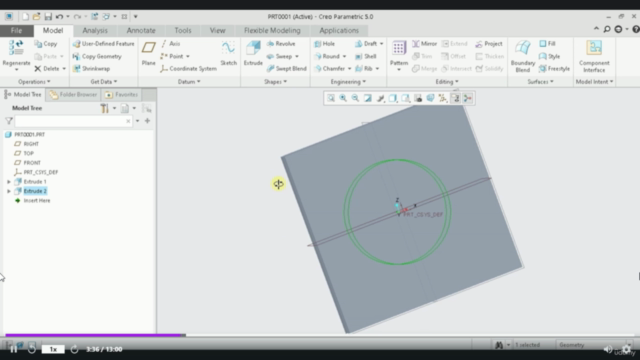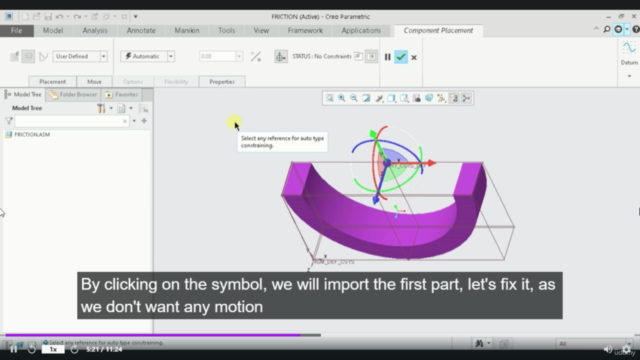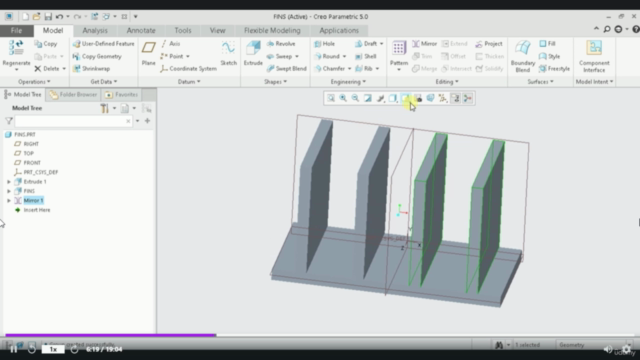PTC CREO Parametric - Design and simulation (3/3) - AulaGEO

Why take this course?
-
Damping Ratio in a Damped Harmonic Oscillator: A damped harmonic oscillator with mass ( m ), damping coefficient ( c ), and spring constant ( k ) has a damping ratio ( \zeta ). Write down the equation of motion for this system, and explain how the damping ratio affects the oscillation amplitude over time.
-
Cantilever Beam in Buildings: Describe the typical use of cantilever beams in construction and provide an example of a structure where cantilevers are used in its design. Explain the advantages of using cantilevers in such structures.
-
Comparing C Channel and I Beam: Compare and contrast the structural channel (C-channel) with an I-beam, highlighting their differences in terms of strength, stiffness, and applications.
-
Projectile Motion on a Inclined Plane: Given a projectile launched at an angle to an inclined plane with an initial velocity ( v_0 ), write down the differential equations that describe its motion considering both gravity and the inclination angle ( \theta ).
-
Thermal Analysis of Conduction Across a Fixed Area: Consider a fixed area ( A ) between two objects at different temperatures. Derive the expression for the rate of heat transfer by conduction through this area, given the thermal conductivity ( k ), and the temperature difference ( \Delta T ) between the two objects.
-
Heat Transfer in a Fluid: Explain how convection occurs in a fluid and under what conditions it is classified as natural or forced convection. Discuss the role of fluid properties, such as viscosity and thermal conductivity, in determining the rate of heat transfer by convection.
-
Thermal Radiation: Describe the process of thermal radiation, including its dependence on temperature and the electromagnetic spectrum. Explain how blackbody radiation is an important concept in understanding emission from objects at different temperatures.
-
Friction Forces in Motion: Explain how static and kinetic frictional forces influence the motion of objects on surfaces, providing examples for both scenarios. Discuss how these forces are quantified and what factors affect them.
-
Simulating Friction with COMSOL Multiphysics: Using COMSOL Multiphysics, simulate the frictional forces between two cylindrical surfaces sliding over each other under the influence of gravity. Model the system by defining appropriate boundary conditions and materials properties to investigate how friction affects the motion and energy dissipation. Document your procedure and analyze the simulation results.
-
Quantum Mechanical Tunneling: Explain quantum mechanical tunneling, providing an example where it is significant in a real-world application, such as a scanning tunneling microscope (STM). Discuss the implications of this phenomenon on the understanding of atomic and subatomic scales.
These questions cover a range of topics from mechanics to thermodynamics, and they require both theoretical knowledge and practical problem-solving skills. Each question can be expanded into a full lesson with detailed explanations, real-world examples, and step-by-step instructions for simulation or problem-solving tasks. The accompanying digital file for each lesson would include the necessary equations, diagrams, and data, while the video could walk through the concepts and simulations in detail.
Course Gallery




Loading charts...